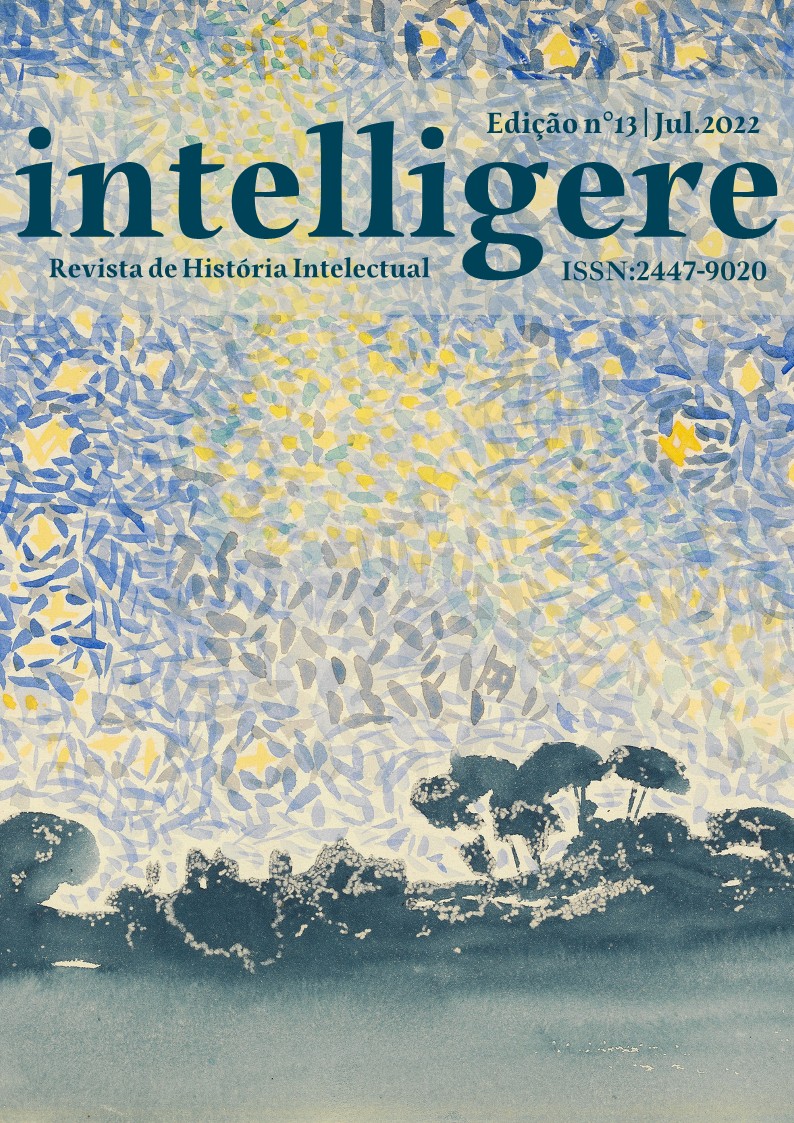Resigned dissatisfaction: comments about A flor da Inglaterra, de George Orwell
DOI:
https://doi.org/10.11606/issn.2447-9020.intelligere.2022.203736Keywords:
Literature., History., Novel., George OrwellAbstract
This article aims at commenting on some aspects of George Orwell's novel Keep the Aspidistra Flying. We will focus our attention on the central character, Gordon Comstock. Our intention is to understand some of the character's choices and attitudes based on inner elements from the narrative, as well as to suggest possible connections with social and historical aspects. This may contribute to the understanding of what we call resigned dissatisfaction, something exemplified by the character.
Downloads
References
BARBERIS, Peter; MCHUGH, John; TYLDESLEY, Mike, (eds). “571: Young Socialist League”. IN: Encyclopedia of British and Irish Political Organizations: Parties, Groups and Movements of the Twentieth Century. London: Pinter, 2000.
BENJAMIN, Walter. “O Autor como Produtor”. In: Obras Escolhidas Volume 1 - Magia e Técnica, Arte e Política. São Paulo: Editora Brasiliense, 1996.
COCKSHOTT, W.P. & ZACHRIAH, D. Arguments for Socialism. Glasgow: University of Glasgow, 2012.
CONSTANTINE, Stephen. Unemployment in Britain Between the Wars. London: Longman, 1980.
EAGLETON, Terry. Marx Estava Certo. Rio de Janeiro: Nova Fronteira, 2012.
GRAMSCI, Antonio. Cadernos do Cárcere – Volume 2. Os intelectuais, O princípio educativo, Jornalismo. Rio de Janeiro: Civilização Brasileira, 2001.
HOBSBAWM, Eric. A Era dos Extremos, o Breve Século XX. São Paulo: Companhia das Letras, 1997.
INGLE, Stephen. The Social and Political Thought of George Orwell. New York: Routledge, 2006.
KENDALL, Walter. The Revolutionary Movement in Britain, 1900-21: The Origins of British Communism. London: Weidenfeld and Nicolson, 1969.
LEE, Robert A. Orwell’s Fiction. Notre Dame: University of Notre Dame Press, 1969.
MARX, Karl. Teorias da Mais Valia – História Crítica do Pensamento Econômico. Rio de Janeiro: Civilização Brasileira, 1980.
ORWELL, George. Keep the Aspidistra Flying. New York: Harcourt Publishing Company, 1956.
ORWELL, George. A Flor da Inglaterra. São Paulo: Companhia das Letras, 2007.
ORWELL, George. Why I Write. London: Penguin Books – Great Ideas, 2004.
PLOMER, William. “Spectator Review”. In: MEYERS, Jeffrey. George Orwell, the Critical Heritage. Boston: Routledge & Kegan Paul: 1995.
POPKIN, Henry. “Commonweal review”. In: MEYERS, Jeffrey. George Orwell, the Critical Heritage. Boston: Routledge & Kegan Paul: 1995.
RICHARDSON, H. W. “The Economic Significance of the Depression in Britain”. In: Journal of Contemporary History (1969) 4#4 pp. 3-19.
SAVAGE, Mike & MILES, Andrews. The Remaking of the British Working Class: 1840–1940. London: Routledge, 2003.
VAN GHENT, Doroty. “Yale Review”. In: MEYERS, Jeffrey. George Orwell, the Critical Heritage. Boston: Routledge & Kegan Paul: 1995.
WORLEY, Matthew. The Foundations of the British Labour Party: Identities, Cultures and Perspectives, 1900–39. Surrey: Ashgate Publishing, 2009.
Downloads
Published
Issue
Section
License
Copyright (c) 2022 Débora Reis Tavares, Daniel Daniel Puglia

This work is licensed under a Creative Commons Attribution 4.0 International License.
Autores que publicam em Intelligere concordam com os seguintes termos:
- Autores mantém os direitos autorais e concedem à revista o direito de primeira publicação, com o trabalho simultaneamente licenciado sob a Licença Creative Commons Attribution que permite o compartilhamento do trabalho com reconhecimento da autoria e publicação inicial nesta revista.
- Autores têm autorização para assumir contratos adicionais separadamente, para distribuição não-exclusiva da versão do trabalho publicada nesta revista (ex.: publicar em repositório institucional ou como capítulo de livro), com reconhecimento de autoria e publicação inicial nesta revista.
- Autores têm permissão e são estimulados a publicar e distribuir seu trabalho online (ex.: em repositórios institucionais ou na sua página pessoal), com reconhecimento da autoria e publicação inicial nesta revista.




